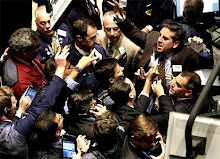10 years from now we will no longer be using desktop computers not even at work. These smartphones plus ipad like devices will be the new norm. Already in Germany many schools are buying ipads instead of macbooks for their students. That is something we should think about too, why is it that the Germany school system gives every student a macbook or ipad and our students get zero, no wonder the Germans are way ahead of the US in engineering and the high schools are leading in math, english and science.
Our education system is broken much like our financial system but hey it is the American way :) just spend BUT not on the right thing. Teachers barely getting paid and we wonder why the education system is on the decline. Oh well what else is new?
Monday, September 27, 2010
Interesting read
Fixed income desks are going to be subject to severe layoffs, according to a highly placed Wall Street insider with information about the plans of his firm and the plans of rivals.
"It's going to be a blood bath. Volume is down for everything except Treasuries and Munis. These guys aren't making money and soon they'll be out of their jobs," he said.
He is sitting in Grand Central's Oyster bar. It's an annual ritual for him: welcoming in September with a frenzy of shell fish and wine.
Typically he invites along a few friends and treats them to a discourse on the state of Wall Street.
"It's a one-two blow for fixed income. The derivatives are being commoditized and put on exchanges. Swoosh. Now you don't need half the people you employ to trade and track those. And volume on corporates and agency paper is way down."
The numbers from SIFMA bear him out. Year to date, the average daily trading volume in US corporate debt is down 2% compared to last year.
Trading in Fannie Mae and Freddie Mac debt is down 7%. Trading in mortgage-backed securities sponsored by Fannie and Freddie is down 13%. And the year to date numbers only tell part of the story. And the part it leaves out is how thin trading became over the summer.
Trading in corporate debt started the year pretty robustly, with $19.7 billion of bonds trading hands in January. But in June, volume dropped down to $14.6 billion and kept dropping right through the summer. The year before, the average daily volume for June was 19.3, so this decline cannot be attributed to merely a summer slowdown.
"We're easily going to cut a quarter to a half of our traders and back office in fixed income. Everyone else is going to do it too," he says.
"It's going to be a blood bath. Volume is down for everything except Treasuries and Munis. These guys aren't making money and soon they'll be out of their jobs," he said.
He is sitting in Grand Central's Oyster bar. It's an annual ritual for him: welcoming in September with a frenzy of shell fish and wine.
Typically he invites along a few friends and treats them to a discourse on the state of Wall Street.
"It's a one-two blow for fixed income. The derivatives are being commoditized and put on exchanges. Swoosh. Now you don't need half the people you employ to trade and track those. And volume on corporates and agency paper is way down."
The numbers from SIFMA bear him out. Year to date, the average daily trading volume in US corporate debt is down 2% compared to last year.
Trading in Fannie Mae and Freddie Mac debt is down 7%. Trading in mortgage-backed securities sponsored by Fannie and Freddie is down 13%. And the year to date numbers only tell part of the story. And the part it leaves out is how thin trading became over the summer.
Trading in corporate debt started the year pretty robustly, with $19.7 billion of bonds trading hands in January. But in June, volume dropped down to $14.6 billion and kept dropping right through the summer. The year before, the average daily volume for June was 19.3, so this decline cannot be attributed to merely a summer slowdown.
"We're easily going to cut a quarter to a half of our traders and back office in fixed income. Everyone else is going to do it too," he says.
Subscribe to:
Comments (Atom)

